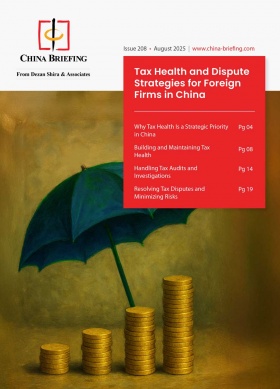Tax Health in China: A Strategic Imperative for 2025 and Beyond
With rising fiscal pressure and expanding digital oversight, tax health in China is emerging as a strategic priority for foreign firms. This article explores why maintaining strong tax health matters—affecting audit exposure, access to government incentives, and long-term credibility in an increasingly data-driven compliance environment.
As China’s business environment becomes increasingly regulated and data-driven, the concept of “tax health” is gaining strategic importance—especially for foreign-invested enterprises (FIEs). Maintaining good tax health means more than avoiding penalties or passing audits. It reflects a company’s ability to operate with transparency, access government support, and reduce financial and reputational risk.
In recent years, several developments have converged to raise the stakes for tax compliance in China: intensifying fiscal pressure, enhanced enforcement capabilities, the nationwide expansion of tax digitalization, and the rise of taxpayer credit systems. These changes are reshaping how foreign businesses must view and manage their tax obligations.
This chapter examines the macroeconomic and regulatory dynamics shaping China’s increasingly complex tax environment and explains why maintaining robust tax health is becoming crucial to long-term business success in the country.
Fiscal pressure is reshaping tax enforcement priorities
China’s public finance system is facing increasing pressure. From January to August 2025, the country’s general public budget revenue reached RMB 14.82 trillion (US$2.03 trillion), showing only modest year-on-year growth. Of this, tax revenue totaled RMB 12.11 trillion (US$1.66 trillion) — a mere 0.02 percent increase compared to the same period in 2024 (with negative growth recorded until July).
Several major tax categories contributed to this sluggish performance:
- Corporate income tax (CIT): Up just 0.3 percent, largely due to reduced profit contributions from central financial enterprises — a reflection of broader corporate profit pressures.
- Customs duties: Down 6.5 percent, indicating weaker import activity and ongoing global trade tensions.
- Import value-added tax (VAT) and consumption tax: Down 6.7 percent.
- Land Appreciation Tax: Down 18.3 percent, as continued adjustments in the real estate sector weigh heavily on local tax bases.
On the other hand, budget expenditures increased by 3.1 percent to over RMB 17.93 trillion (US$2.46 trillion), driven by inflexible spending obligations in areas such as healthcare, education, and social welfare. At the same time, expectations for additional fiscal stimulus to support economic growth are placing further strain on public finances.
In this context, tax authorities are under strong pressure to preserve fiscal stability—by closing compliance loopholes and tightening administration. While the policy direction does not suggest heavier tax burdens, it does signal reduced tolerance for inefficiencies, errors, or aggressive tax practices.
Key implication for FIEs: Refinement of tax enforcement is now a policy imperative. Tax health protects businesses from being caught in the crosshairs of tightened fiscal oversight.
Digitalization is transforming how tax compliance is monitored
China’s tax enforcement model is evolving rapidly with the support of new technologies. At the heart of this transformation is the Golden Tax Phase IV system—a national initiative integrating real-time data analytics, AI-based risk scoring, and cross-departmental data exchange. Several tools and mechanisms now power this data-driven enforcement approach:
- Smart e-invoicing (e-fapiao): All enterprises are transitioning to digital invoices, creating a fully traceable tax trail.
- Automated risk identification: Algorithms can flag discrepancies across corporate filings, financial reports, and payroll data.
- “Taxation by data”: Authorities are shifting from reactive checks to proactive detection of anomalies—sometimes in real time.
As these technologies mature, tax authorities are now better equipped to detect irregularities in areas such as:
- VAT chain mismatches;
- Fraudulent VAT invoices;
- Improper expense classification and deduction;
- Excessively low employee tax or social security contributions; and
- Unreasonable transfer pricing arrangements.
In this high-transparency environment, even small compliance gaps can trigger scrutiny. For FIEs, building systems to mirror the sophistication of enforcement tools is essential.
Taxpayer credit ratings now influence business outcomes
Alongside digital transformation, China is also institutionalizing credit-based tax governance. Through the State Taxation Administration’s unified rating system, companies are assigned a credit grade—A, B, M, C, or D—based on their past tax performance and filing behavior.
A-grade taxpayers enjoy benefits such as:
- Streamlined VAT refunds and higher invoice quotas;
- Lower audit frequency; and
- Priority access to pilot incentives, government-supported projects, and enhanced financing opportunities, including bank loans and other credit facilities.
For example, Qinghai province recently announced 44 facilitation measures for A-grade taxpayers across taxation, project financing, and regulatory approval channels. These include reduced audit sampling, priority in fund allocation, and eligibility for preferential policies.
D-grade taxpayers, by contrast, face stricter scrutiny, limited access to public resources, and reputational risks when dealing with government departments. This system reflects a broader shift toward incentive-driven compliance, in which trustworthiness unlocks efficiency and opportunity. As credit ratings become an operational currency in China, businesses must view tax compliance not only through the lens of risk prevention but also as a way to enhance their market position.
Increasing volume and complexity of tax audits and disputes
Along with enforcement upgrades, China is seeing a steady rise in tax inspections, reviews, and legal disputes—especially in technically complex areas.
Several factors contribute to this trend:
- The rollout of digital systems makes audits easier to initiate and harder to contest;
- Ongoing implementation of BEPS-related measures, such as country-by-country reporting (CbCR) and the Common Reporting Standard (CRS), has made cross-border activity more transparent; and
- Increasing reliance on interpretation of detailed tax rules—such as expense deductibility, high-tech enterprise qualification, and transfer pricing—has created more opportunities for disputes between taxpayers and authorities.
Foreign companies, particularly those with complex structures or international operations, are at higher risk of audit escalation. While many disputes are still resolved during the review stage, a growing number proceed to administrative reconsideration or even litigation.
Tax disputes are no longer isolated events. They are becoming part of the normal operating environment for foreign firms—making prevention, preparedness, and negotiation skills critical.
Key takeaways
Tax health has become a strategic imperative for foreign firms in China. The convergence of fiscal pressure, regulatory refinement, and digital enforcement has dramatically changed the landscape in which FIEs operate.
Firms that treat tax health as a core part of their business strategy—investing in systems, building internal awareness, and staying ahead of regulatory trends—will be in a far stronger position to manage risks, unlock opportunities, and build lasting relationships with tax authorities.
As subsequent chapters in this publication will show, maintaining tax health requires more than filing on time. It demands regular internal reviews, strategic use of incentives, effective audit handling, and—when necessary—skilled dispute resolution. In China’s evolving tax environment, these are no longer optional practices, but essential components of a resilient and competitive business.
(This article was originally published in our China Briefing magazine issue titled: Tax Health and Dispute Strategies for Foreign Firms in China, and has since been updated with the latest available data.)
About Us
China Briefing is one of five regional Asia Briefing publications, supported by Dezan Shira & Associates. For a complimentary subscription to China Briefing’s content products, please click here.
Dezan Shira & Associates assists foreign investors into China and has done so since 1992 through offices in Beijing, Tianjin, Dalian, Qingdao, Shanghai, Hangzhou, Ningbo, Suzhou, Guangzhou, Haikou, Zhongshan, Shenzhen, and Hong Kong. We also have offices in Vietnam, Indonesia, Singapore, United States, Germany, Italy, India, and Dubai (UAE) and partner firms assisting foreign investors in The Philippines, Malaysia, Thailand, Bangladesh, and Australia. For assistance in China, please contact the firm at china@dezshira.com or visit our website at www.dezshira.com.
- Previous Article US-China Relations in the Trump 2.0 Era: A Timeline
- Next Article







